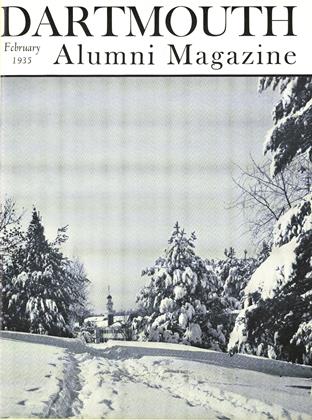They used to run stories on sports pages about exciting games of chess between colleges with a stadium full of spectators looking on and applauding. Then some humorist had a story about the examination of the brightest students of say Dartmouth and Harvard before a huge crowd and college yells being given with gusto as each bright student put his opponent to shame, such exhibitions to take the place of football and deemphasize it fully. When recently however the New England Association of Teachers of English sent out questionnaries on reading to Dartmouth and Smith graduates they hardly expected that out of a selected group of classes, there would be exactly 271 answers from each institution. And now we have a literary competition between Dartmouth and Smith; the stands are filled and we are ready to cheer.
Dartmouth kicks off. Since Dartmouth spends two hours and 50 minutes a day in reading against Smith's two hours and 22 minutes it has the first advantage and kicking with the wind drops the ball on Smith's ten yard line. But Smith decides to rush a bit, instead of punting from unfavorable position, and since the average reading time for pleasure is one hour and 41 minutes for Smith, against one hour and 25 minutes for Dartmouth, makes two first downs in succession gaining nearly to midfield. In the matter of those graduates who do not know how to use a library Smith has only 10 percent who do not know how to find the book they desire. But look, 20 percent of the Dartmouth grads do not know how to find the book they desire The punt is fumbled and it is Smith's ball on Dartmouth's five yard line. First down
In the matter of systematic reading 24 percent of the Smith graduates conform But see, 36 percent of the Dartmouth graduates qualify. Smith is stopped at the goal line and Dartmouth punts out of danger.
The ball is changing hands constantly now at midfield. At Smith 193 grads prefer fiction to 160 for Dartmouth. There is also an advantage to Smith on Biography—173 to 115. That was a forward pass which brought the ball to Dartmouth's twentyfive yard stripe. But Dartmouth bests Smith in Science preferences 22 to 13, in Essays 47 to 22, and in Economics, Politics, and Law 48 to 11 and the ball is for the first time in Dartmouth's possession in Smith territory. The Big Green is striking its stride. (It must be the second half!)
Smith holds for downs quickly in Poetry preferences 29 to 26, makes a few yards 011 Psychology 17 to 8, and then on a spinner a Smith back gets away for forty yards on Travel 62 to 36. For the rest of the quarter play is about even. In the matter of Collegebooks reread the play continues even through the second quarter. When it came to the matter of influence, 39 Dartmouth men were influenced in reading by their college course, while only 25 Smith grads were influenced. This is indicative of a long run from kickoff on the part of Dartmouth at the beginning of the second half. Smith held however, took the ball and made much advance in the matter of homeinfluence, 81 to 48. Dartmouth took the ball away in the matter of interest in subject matter 23 to 14. "The College," according to the report "seems to rate higheramong Dartmouth men than among Smithgraduates."
In the matter of Aversions Smith had a distinct advantage in Cheap Writing, 84 to 62. Other aversions such as silly sentiment, detective, sex, and bunk averaging about equal. In favorite authors however, Dartmouth scored with 131 against Smith's 123 and that just about closed the day.
 View Full Issue
View Full Issue
More From This Issue
-
 Article
ArticleHANOVER BROWSING
February 1935 By Herbert F. West '22 -
 Article
ArticleForgotten Dartmouth Men
February 1935 By Prof. H. F. West '22 -
 Class Notes
Class NotesClass of 1930
February 1935 By Albert I. Dickerson -
 Class Notes
Class NotesClass of 1908
February 1935 By L. W. Griswold -
 Article
ArticleTHE DARTMOUTH EYE CLINIC
February 1935 -
 Class Notes
Class NotesClass of 1934
February 1935 By Mariin J. Dwyer Jr.
The Editors
-
 Article
ArticleFootball Schedules
December 1934 By The Editors -
 Article
ArticleThe Gridgraph
December 1934 By The Editors -
 Article
ArticleSaying It in Print
January 1935 By The Editors -
 Article
ArticleAmong the Freshmen
January 1935 By The Editors -
 Article
ArticleTwo Emergencies
June 1935 By The Editors -
 Article
ArticleVox
November 1975 By THE EDITORS







